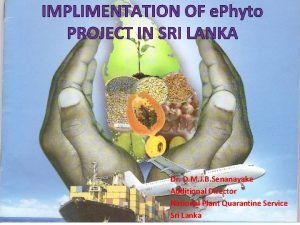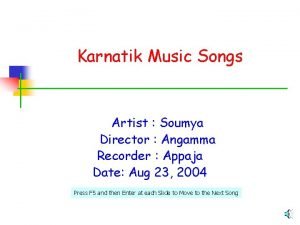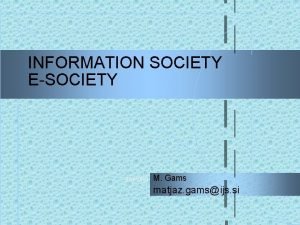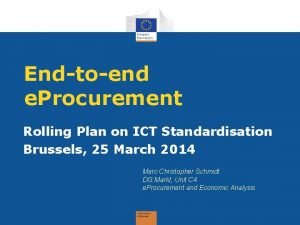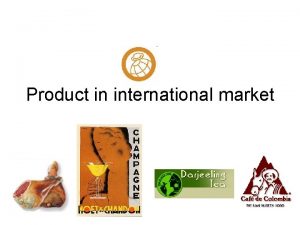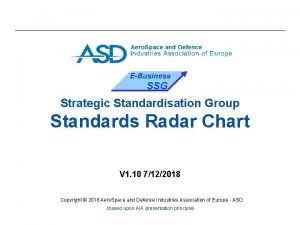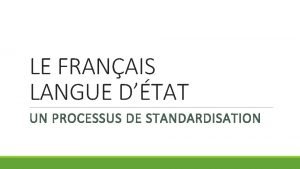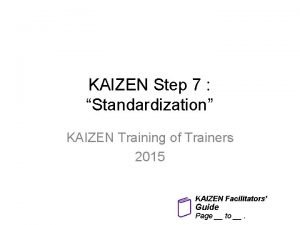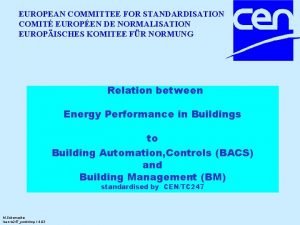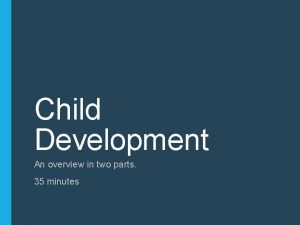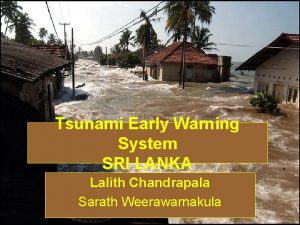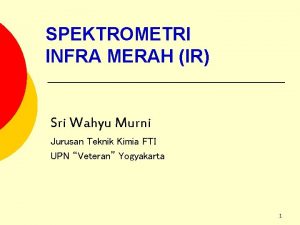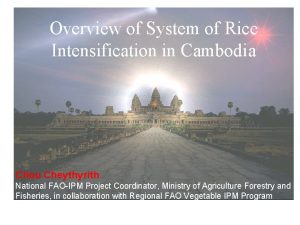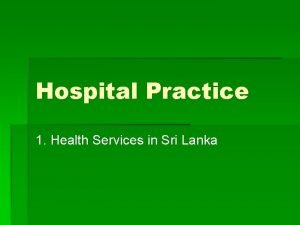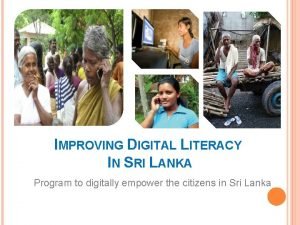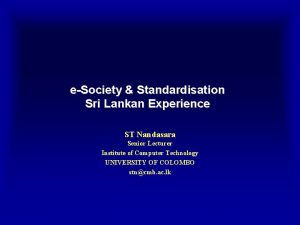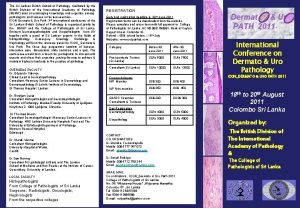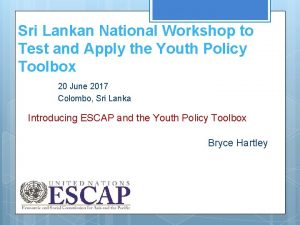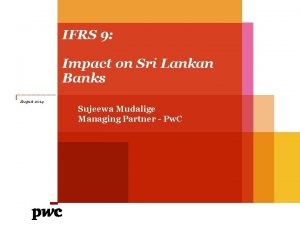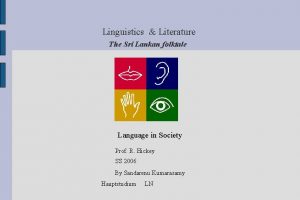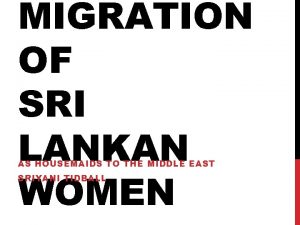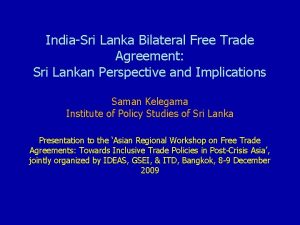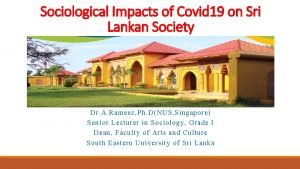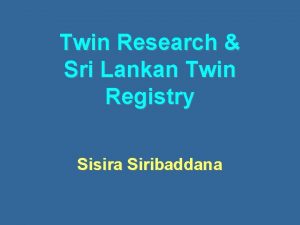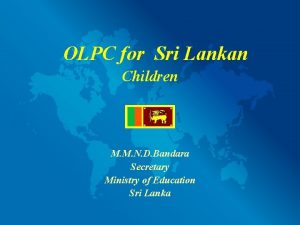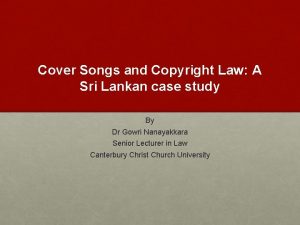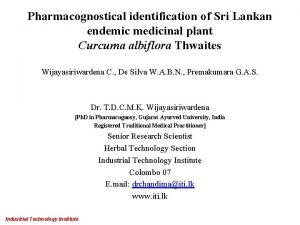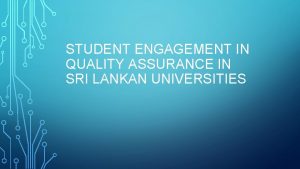eSociety Standardisation Sri Lankan Experience ST Nandasara Senior





























- Slides: 29

e-Society & Standardisation Sri Lankan Experience ST Nandasara Senior Lecturer Institute of Computer Technology UNIVERSITY OF COLOMBO stn@cmb. ac. lk

e-Society The society that would be created by the extensive use of Information and Communications Technologies throughout the world. 2

e-Society will be based on • • • Information Knowledge Availability Access Use 3

The Knowledge Society • • • A Knowledge based society Not necessarily with the use of ICTs Our own Knowledge Society of the past: – – – – Mahavihara Abhayagiriya Aluvihara Yoda Ela Sigiriya Maduru Oya Dam Mihintale 200 BC 100 AD 600 AD 800 AD 4

Sri Lanka’s priority status for Education • Temple based education • The Pirivena system of education • Free Education up to University Level 5

ICTs in Sri Lanka • Computers (hundreds of thousands) l Communications (800, 000 fixed lines) l Multi-Media (millions of potential users) l Internet (100, 000 connections) l Human Resources (potential of hundreds of thousands) l Products and Services 6

In order to service all these sectors, ICTs depend on knowledge workers. They must : • • be Knowledgeable be Adaptable be Creative be Innovative have analytical skills Continue to learn Communicate MOST OF OUR YOUTH COULD EASILY ACQUIRE THESE ATTRIBUTES GIVEN THE OPPORTUNITY 7

Concerns Today • Management & Security of ICT systems • Laws, Procedures and their Implementation – Admissibility, Crime, Fraud & Data Protection • High Cost of Equipment and Services – GST & Other levies • Absence of Internet Exchange(IX) • Lack of coordination, collaboration and commitment • Large numbers of half baked “IT personnel” 8

Infrastructure needs for an e-Society • • Awareness Easy Access Communications Infrastructure – Backbone – Access points – International Bandwidth Affordable tariffs e - Security Cyber Laws Content 9

Some examples of e-Society based activities in Sri Lanka • • • Election Results 1982 -2000 Mobile Computer Unit 1987 National Portal (www. lk) 1995 ISO/UNICODE standard for sinhala 1986 -1999 Character Shapes, Translation & OCR Live Radio Programme (National Broadcaster) Live Television Programme (National Channel) Kotmale Community Radio & Internet (www. kirana. lk) Multi Purpose Telecentres ( Kahawatta) Sltnet 10

Election results 11

National Portal www. lk 12

ISO 10646/ UNICODE STANDARD Sinhala Standard Code and Key Board 13

Live Radio Programme (every Tuesday 9000 -1000) 14

Kotmale Community Radio (www. kirana. lk) 15

Kotmale Community Radio (www. kirana. lk) 16

Users at Kotmale, Nava Tispane, Gampola and Nawalapitiya 17

The New Sltnet Service • • • 10 Mbps Bandwidth access speeds upto 128 kbps Single Access Number 150 to dial from any location in Sri Lanka • 1500 dial up calls simultaneously • Optical Fibre backbone • International Roaming in 150 countries 18

The Rural Community • In most countries of the developed world, the majority consist of the rural community • In Sri Lanka this is 80% of the population • They are aware of the benefits of ICTs but are unable to obtain them. 19

The Have-nots suffer from • Poverty • lack of educational opportunities ( schools, teachers, books etc. ) • lack of information • lack of expertise • lack of “clout” • and lack of ICT facilities 20

The consequences of the Digital Divide • • • Isolation of certain societies Collapse of the global economy Rejection of an e-society Anarchy and chaos Repercussions on the future stability of the international community 21

Ways of reducing the Digital Divide • • • • E-Democracy e-Government e-Health Trust Cooperation Competitiveness Access e-learning opportunities encourage micro e-commerce Open source software Tariff free communications Affordable ICT costs Identify and support talent 22

Technological Developments that would help reduce the digital divide • • Mobile Internet Voice over IP ( local and international ) Interactive TV Kiosks and Multipurpose Tele Centres 23

What should Sri Lanka do? • ICT Policy – Very high priority for ICT – Integrated Approach – Vision – Infrastrucuture • Develop Centres of Excellence (not degree factories) – Do not kill the state sector Universities – Avoid levelling down and “poverty distribution” • Utilise expatriate community and encourage exchanges • Encourage Public-Private sector cooperation 24

EXPLOITATION OF IT FOR NATIONAL DEVELOPMENT • • • THE USE OF IT FOR EFFICIENT ADMINISTRATION AND MANAGEMENT THE USE OF IT FOR COMPETITIVE ADVANTAGE IN FINANCE, TRADE AND COMMERCE THE CAPTURE OF PART OF THE GLOBAL SOFTWARE AND IT SERVICES MARKET THE USE OF IT IN PROVIDING INFORMATION ON THE COUNTRY AND ITS CULTURE TO THE WORLD AT LARGE AND AS A TOOL FOR THE ACQUISITION OF INFORMATION BY ALL SECTORS OF THE POPULATION CREATION OF AWARENESS AND AN IT CULTURE THE USE OF IT IN ALL OTHER ASPECTS OF THE NATIONAL DEVELOPMENT EFFORT 25

Some initiatives of the ICT • • • Sinhala standard code (1987 -2000) National Portal www. lk (1995) Live Radio Programme (1998) Live TV Programme (1999) Election results processing, TV display & release to internet [Trilingual](1982 -2000) Display of Cricket scores on SLRC Multi media development and training including TCTP Graduate Training Programme (1999) Multimedia Centre (2001) IT for Schools (2001) Internet Based e-Leaning Project (2001) External Degree - BIT (2000) 26

External Degree - BIT 27

ICT based learning (e- learning) • ICTs have changed the traditional methods of learning – – – Distance does not matter Expertise can be shared Technology can replace the Expert Can be very interactive and on line Can be timed and developed to suit individual needs Achievement can be tested and subsequent lessons provided accordingly – Many features such as graphics, animation and simulation can be used. – Reference material is available on line 28

THANK YOU stn@cmb. ac. lk 29
 Phytosanitary certificate sample
Phytosanitary certificate sample Sri rama sri rama sri manoharama
Sri rama sri rama sri manoharama Esociety major
Esociety major Esociety major
Esociety major How is the solution done
How is the solution done Property standardisation group
Property standardisation group Rolling plan for ict standardisation
Rolling plan for ict standardisation Mandatory product adaptation
Mandatory product adaptation Property standardisation group
Property standardisation group Processus de standardisation
Processus de standardisation Standardisation vs adaptation in international marketing
Standardisation vs adaptation in international marketing Step 7 training
Step 7 training European committee for standardisation
European committee for standardisation What is indirect experience
What is indirect experience Experience expectant vs experience dependent
Experience expectant vs experience dependent Early experience vs. later experience
Early experience vs. later experience Nalika diwulang lenggahe kudu
Nalika diwulang lenggahe kudu Formato nota de venta
Formato nota de venta Sri krsna caitanya prabhu
Sri krsna caitanya prabhu Tsunami early warning system sri lanka
Tsunami early warning system sri lanka Krishna janmashtami hitung mundur
Krishna janmashtami hitung mundur Sri juari santosa
Sri juari santosa Sri test practice
Sri test practice Sri system of rice intensification
Sri system of rice intensification Administrative structure of health service in sri lanka
Administrative structure of health service in sri lanka Computer literacy in sri lanka
Computer literacy in sri lanka Dr sri hastuti andayani
Dr sri hastuti andayani Performance adalah
Performance adalah Sri score
Sri score Agriculture insurance in sri lanka
Agriculture insurance in sri lanka
